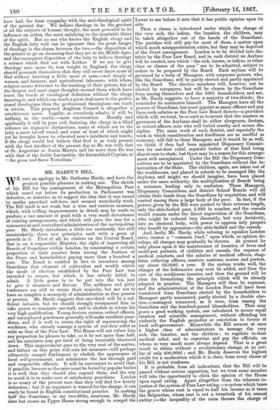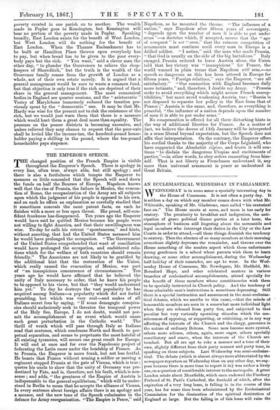MR. HARDY'S BILL.
WE owe an apology to Mr. Gathorne Hardy, and have the greatest possible pleasure in making one. The sketch of his Bill for the management of the Metropolitan Poor which oozed out before its production in Parliament was defective, so defective as to suggest the idea that it was issued to soothe parochial self-love, and seemed wretchedly weak. The Bill itself is not weak, but a wise and cautious measure, which, with trifling improvements in detail, may be made to produce a vast amount of good with a very small disturbance of existing arrangements, and which will pave the way for a symmetrical and centralized administration of the metropolitan poor. Mr. Hardy introduces, a little too cautiously, but still unmistakably, three new principles, each with a germ of growth in it. First of all, he confers on the Central Board, that is, on a responsible Minister, the right of improving all Boards of Guardians within London, by nominating a certain proportion of their number from among the Justices of the Peace and householders paying more than a hundred a year. The Board is enabled in fact to introduce among Guardians that element of cultivation and wealth which the mode of election established by the Poor Law was intended to secure, but which it has utterly failed to admit. A little green is to be put into the tea, just to give it clearness and flavour. The milkmen and petty tradesmen are still to retain their majority, but are not to have so complete a monopoly of administration as they possess at present. Mr. Hardy suggests that one-third will be a suf- ficient infusion, but we should strongly recommend him to take power to nominate one-half, and to abolish in return his very high qualification. Young doctors, curates, retired officers, and unemployed gentlemen generally will make excellent guar- dians, and it is well to retain the right of representing the workmen, who already manage a system of out-door relief as wide as that of the Poor Law. The House will not refuse him any proportion he pleases to take, so it be not more than half, and his nominees may get tired of being invariably blustered down. This improvement goes to the very root of the matter, and failure on this point will ruin his measure—will perhaps ultimately compel Parliament to abolish the appearance of local self-government, and administer the law through paid and responsible officials. It will be convenient to avoid that, if possible, because as the rates must be levied by popular bodies it is well that they should also expend them, and the way to avoid it is to make sure of satisfactory guardians. London is so weary of the present men that they will find few hearty defenders ; but if an argument is wanted for the change, it can easily be found in English constitutional practice. In making half the Guardians, or say two-fifths, nominees, Mr. Hardy does but create an Upper House strong enough to compel the outlay ;—the inequality of the rates throws the chair of Lower to see before it acts that it has public opinion upon its side.
Then a clause is introduced under which the charge of the very sick, the infirm, the lunatics, the children, may be taken altogether out of the hands of the Guardians. The parishes will still pay for most of them, a matter upon which much misapprehension exists, but they may be deprived of the direct management. London is to be divided into dis- tricts by the Poor Law Board, and in each district an Asylum will be created, into which "the sick, insane, or infirm, or other class or classes of the poor" are to be admitted, subject to orders to be prepared by the Board. Each asylum will be governed by a body of Managers, with corporate powers, who, like the Guardians, will be partly elected and partly appointed by the Board. The elective members will, however, not be elected by ratepayers, but will be chosen by the Guardians from among themselves and the 100/. householders, and are, as Mr. Hardy suggests, to have a majority of two-thirds; the remainder he nominates himself. The Managers have all the powers of Guardians, but must appoint as many officers and pay them such salaries as the Poor Law Board directs—a provision which will, we trust, be so used as to secure that the masters or governors of the Asylums shall be either clergymen, doctors, or retired officers, men who will forbid cruelty and secure dis- cipline. The main work of each district, and especially the work in which consideration and kindliness are as needful as economy, will fall to these Managers, and it would be as well, we think, if they had been appointed Dispensary Commit- tees for out-door relief, separate bodies of that kind being almost sure to clash; but there may be a reason for this arrange- ment still unexplained. Under the Bill the Dispensary Com- mittees are to be appointed by the Guardians without the in- tervention of the State. The children, again, are taken out of the workhouses, and placed in schools to be managed like the Asylums, and might, we should imagine, have been placed under the same authority, the multiplication of Boards being a nuisance, leading only to confusion. These Managers, Dispensary Committees, and district School Boards will all obtain their funds from the Guardians by requisition, and will control among them a large body of the poor. In fact, if the powers given by the Bill were pushed to their extreme length, only the able-bodied poor, 2,889 in number, and the casuals would remain under the direct supervision of the Guardians, who might be reduced very discreetly, but very decisively, into an electoral body, with power to oppress only paupers who benefit by oppression—the able-bodied and the casuals.
And, lastly, Mr. Hardy, while refusing to equalize London rates, creates a " common fund," upon which, as opinion de- velops, all charges may gradually be thrown. At present he only places upon it the maintenance of lunatics, of fever and small-pox patients, of children and casuals, the expense of medical comforts, and the salaries of medical officers, chap- lains, relieving officers, masters, matrons, nurses and porters, say about 60,000/. a year. If the system works well, the charges of the Infirmaries may next be added, and then the cost of the workhouse inmates, and then the ground will be clear for formalizing the principle which will be already adopted in practice. The Managers will then be supreme, and the administration of the London Poor will have been transferred from Guardians elected by the householders to Managers partly nominated, partly elected by a double elec- tion,—managers winnowed, as it were, from among the Guardians and the hundred-pound hbuseholders. That may prove a good working system, one calculated to secure equal taxation and scientific management, without offending too violently the English prejudice or conviction in favour of local self-government. Meanwhile the Bill secures at once a higher class of administrators to manage the very sick, the lunatics, and the children ; to regulate in-door medical relief, and to supervise and pay the officials, on whom so very much must always depend. That is a great result to obtain without a revolutionary change, at an out- lay of only 400,000/. ; and Mr. Hardy deserves the highest credit for a moderation which it is clear, from every clause of his Bill, is not weakness.
It is probable, from all indications, that the Bill will be passed without serious opposition, but we trust some member will take the opportunity to elicit the opinion of the House upon equal rating, Apart altogether from the inherent in- justice of the system of Poor Law rating,—a system which taxes the grocer whose rent is equal to half his income as it taxes the Belgravian, whose rent is not a twentieth of his annual poverty created in one parish on to another. The wealth made in Poplar goes to Kensington, but Kensington will bear no portion of the poverty made in Poplar. Speaking broadly, East London exists for the benefit of West London, but West London will do nothing for the benefit of East London. When the Thames Embankment has to be built or Hamilton Place thrown open everybody has to pay, but when bread has to be given to the poor every- body pays but the rich. " You want," said a clever man the other day, " to plunder the Grosvenors to relieve the shop- keepers of Shoreditch," but the truth is the wealth of the Grosvenor family comes from the growth of London as a whole, not of their own estate merely. It is argued that a general management would be sure to waste a common fund, but that objection is only true if the rich are deprived of their share in the general management. The most economical bodies in England are quarter sessions, and the " aristocratic " Vestry of Marylebone immensely reduced the taxation pre- viously spent by the " democratic " one. It may be that Mr. Hardy was wise for the present not to risk the resistance of the rich, but we would just warn them that there is a measure which would hurt them a great deal more than equality. The pressure on the poorer districts is becoming excessive, and unless relieved they may chance to request that the poor-rate shall be levied like the income-tax, the hundred-pound house- holder paying a shilling in the pound, where the ten-pound householder pays sixpence.































 Previous page
Previous page